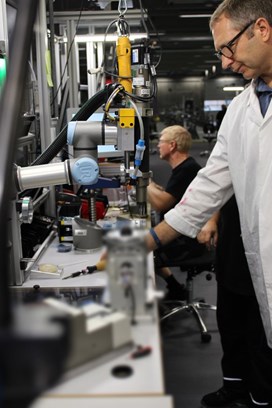
Q: As you look back on UR’s 15-year history, what stands out the most for you?
A: For me, it’s the ability to look back to the beginning and see that the founders were—and we still are—on the right track. I always start presentations by talking about our vision of empowering people. That may seem like an odd vision for a company that makes robots. But 15 years ago, we saw an untapped opportunity to empower people to accomplish great things with a new kind of automation that is easy to use and collaborates with them. That vision hasn’t changed.
Q: How have you been able to maintain that vision as both UR and the market have evolved and customers’ expectations have changed?
A: I believe that we have been able to maintain our vision and our focus, despite the rapid evolution of the collaborative robot market over the last years. Many believe that when you’re a disrupter and first mover that success is easy as you have no competition. But it is quite the opposite…. It has meant that we have worked hard to create an entirely new market segment, a new global distribution network, a new ecosystem of developers, and ultimately a completely new business model. There’s a lot of work in creating awareness, influencing standards, and changing customer perceptions and expectations, which have been influenced by their experience of traditional robots.
As new players enter the market, I see that as a positive for us. Firstly, it’s a validation that we're on the right track, and it further supports the awareness within the market and thereby expands our potential customer base. Customers typically don’t want to have a single-sourcing situation in their supply chain and production in order to avoid risk. We were building an entirely new category, and many of the larger customers essentially kicked the tires for many years, validating our technology, but hesitated to adopt our products fully. However, as the total market grew, our growth scaled fast because customers had alternatives and it further legitimized the technology.
But customers’ expectations concerning quality have also increased over the years, as they deploy more advanced applications in their production processes. This is a natural maturing of the market and requires us to continually finetune our technology but also our business model as a whole. And that journey doesn’t stop, as applications, settings and circumstances continue to evolve. We will have to work closer with our channel and ecosystem partners to get even closer to end users over the next years.


